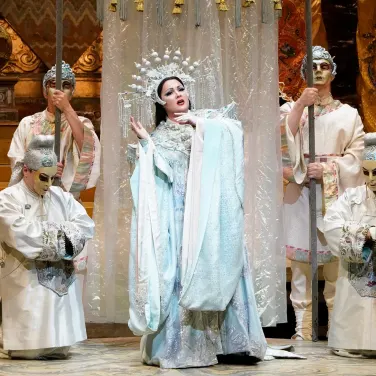
About
This is not by "TuranDot" it is by Giacomo Puccini. Those of you who listen to this, please fix the artist tag. Read more on Last.fm
Genres
No info to show.
Frequently Asked Questions
- What is the plot of Turandot?
- The plot of Turandot centers around the icy Princess Turandot of ancient China, who has sworn never to marry unless a suitor can answer her three riddles correctly. Any man who fails is executed. The opera begins when Prince Calaf becomes captivated by Turandot's beauty and resolves to win her hand, despite the deadly risk. After successfully answering all three riddles, Turandot is distraught and refuses to marry him. Calaf, showing compassion, offers her a way out: if she can guess his name by dawn, he will forfeit his life. Turandot's search for his identity drives the tension to a climax. Ultimately, Calaf reveals his name, trusting in Turandot's change of heart, and she chooses love over vengeance. Turandot is a tale of love, sacrifice, and the transformative power of compassion, culminating in a triumphant and emotional conclusion. This renowned opera is celebrated for its dramatic storyline and iconic arias, including the famous "Nessun dorma."
- Where can I watch Turandot opera?
- You can watch Turandot opera at major opera houses and theaters worldwide, often as part of their regular seasonal programming. Renowned venues such as The Metropolitan Opera in New York, Royal Opera House in London, and La Scala in Milan frequently feature Turandot in their schedules. Additionally, touring opera companies and local theaters may stage performances throughout the year. For those seeking digital experiences, many opera houses offer live streams or recorded performances on their official websites or platforms like YouTube, Medici.tv, and OperaVision. Some streaming services specializing in classical music and opera also provide access to recorded productions of Turandot. To find upcoming performances and secure your tickets, check official opera house websites, reputable ticketing platforms like Gigfomo, or local event listings. Attending Turandot live is an unforgettable experience, showcasing grand sets, stunning vocals, and the powerful drama of Puccini's masterpiece.
- How is Turandot pronounced in English?
- Turandot is pronounced in English as "TOO-rahn-dot." The emphasis is placed on the first syllable, and the "t" at the end is clearly pronounced, unlike the original Italian pronunciation, which sounds closer to "Too-rahn-DOHT." In English, many people mistakenly pronounce it "Tur-an-dot" with a hard "t" sound at the end, which is widely accepted in Anglophone countries. The name comes from the Persian word for "daughter of Turan," and the opera's pronunciation has evolved as it entered international repertory. If you want to sound authentic, use "TOO-rahn-dot" when referring to this iconic opera in English conversation. Knowing the correct pronunciation is especially helpful when purchasing tickets, discussing the show, or searching for performances online.
- What is the moral of Turandot?
- The moral of Turandot revolves around the transformative power of love, compassion, and vulnerability. Throughout the opera, Princess Turandot is portrayed as cold and unyielding, driven by a desire to avenge her ancestor's suffering. However, when confronted by Calaf's unwavering love and his willingness to risk his life and reveal his true identity, Turandot undergoes a profound transformation. The opera suggests that true love is not about conquest or pride, but about understanding, empathy, and self-sacrifice. It also highlights the importance of facing one's fears and embracing change, as Turandot ultimately chooses love over vengeance. The story encourages audiences to let go of bitterness and open their hearts to forgiveness and genuine connection. Turandot's journey from cruelty to compassion delivers a timeless lesson about the redemptive qualities of love and the courage it takes to trust and be vulnerable.
- Is Turandot a princess?
- Yes, Turandot is a princess in the opera. She is the daughter of the Emperor Altoum and the central figure around whom the story revolves. Princess Turandot is known throughout the land for her beauty, intelligence, and icy demeanor. She imposes a deadly challenge upon her suitors: answer three riddles correctly or face execution. This test is Turandot's way of protecting herself from marriage and avenging a traumatic past within her royal family. Her royal status plays a significant role in the opera, influencing both the plot and the motivations of other characters. Turandot's status as a princess is crucial to the opera's themes of power, pride, and transformation, as she ultimately evolves from a figure of fear into one of love and compassion by the end of the story. If you're searching for tickets to "Turandot,"